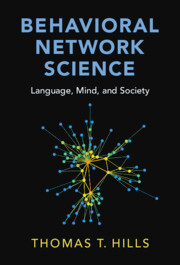Book contents
- Frontmatter
- Contents
- Additional Resources
- Introduction: Structure Matters
- Part I A Brief Guide to Network Science
- Part II Language
- Part III Mind
- Part IV Society
- 14 Network Illusions: How Structure Misleads Us
- 15 Group Problem Solving: Harnessing the Wisdom of the Crowds
- 16 The Segregation of Belief: How Structure Facilitates False Consensus
- 17 The Conspiracy Frame: Coherence through Self-Supporting Beliefs
- 18 The Kennedy Paradox: Games of Conflict and Escalation
- 19 Fund People Not Projects: A Universal Basic Income for Research
- References
- Index
14 - Network Illusions: How Structure Misleads Us
from Part IV - Society
Published online by Cambridge University Press: 08 November 2024
- Frontmatter
- Contents
- Additional Resources
- Introduction: Structure Matters
- Part I A Brief Guide to Network Science
- Part II Language
- Part III Mind
- Part IV Society
- 14 Network Illusions: How Structure Misleads Us
- 15 Group Problem Solving: Harnessing the Wisdom of the Crowds
- 16 The Segregation of Belief: How Structure Facilitates False Consensus
- 17 The Conspiracy Frame: Coherence through Self-Supporting Beliefs
- 18 The Kennedy Paradox: Games of Conflict and Escalation
- 19 Fund People Not Projects: A Universal Basic Income for Research
- References
- Index
Summary
The Brexit referendum and the US presidential election of Donald Trump were a surprise to many, on both sides of the fence. In this information age, it is useful to ask how so many people could be so wrong about issues of so much importance. If we all knew what everyone else was thinking there could be no surprise. We are, in fact, wrong about many things when it comes to estimating the beliefs of the majority. Many of our errors arise not because our brains are tricking us, but because our appreciation of structure is underdeveloped. For example, for the majority of people, the places they vacation to are not average destinations, just as the traffic they experience is not average traffic nor the classes they sit through of average attendance. This is because, by definition, the most crowded places are attended by the most people. Similar illusions lead us to overestimate how many friends the average person has, confuse us into making backwards inferences about class and gender divisions, and allow politicians to misrepresent their populations. All of these are guaranteed outcomes of certain kinds of structure which an understanding of networks demystifies.
Keywords
Information
- Type
- Chapter
- Information
- Behavioral Network ScienceLanguage, Mind, and Society, pp. 227 - 243Publisher: Cambridge University PressPrint publication year: 2024
